Torr on Survey |
| [The survey form] [1. The Mission] [2. Use a Database !] [3.
Devote Yourself !] [4. Sour Losers] [5. Flexible concentration] [6. Holistic Chess] [7. Why move at all ?]
[8. The Tutorr's 15 Guidelines]
[9. Feedback page] [10. Downloads] Concentrate ! Did you ever consider, now, the impact your body posture and muscle tension might have on your chess performance ? Did you ever find it important to have a good night's sleep before playing, or did you ever notice an urge to be quite clear in the head and appropriately feed-off ? In short, did you ever consider how the relatedness of mind and body influences your game ? The survey question 24 measured this aspect to some extent - the results are seen in Table 24. It seems that for all players, weak and strong alike, about 60 % are 'somewhat tense' during the game, whilst the bodystates 'relaxed' and 'very tense' share the last 40 % rather evenly (there are some small differences through the five rating-groups). Thus, a modest stress-level while playing seems to be commonplace for chessplayers of all strenghts. The physiological impact of a modest stresslevel is an elevated concentration of adrenaline (the fight hormone of mankind) in the bloodstream and hence an increased capacity for thinking, alertness and decision-making (due to higher blood pressure and bigger oxygen flow to the brain). Don't say that chessplayers are bodynerds ! When it comes to the phenomenon of concentration the results from the survey clearly suggest that you should concentrate very much while playing, that is, if you still, now, want to improve your chess. You may consider the data in Table 25 for a moment [*** take a moment ***] only to realize that there is a very positive correlation between ratings and the extent of being 'very concentrated'. For instance, 42 % of the experts (rated above 2400) concentrate very much during a game, as opposed to only 23 % of those rated below 1600. Consider what these figures suggest to you. I'm sure you will agree to our experts' habit no. 8: Concentration is very important ! Interestingly, concentration does not
necessarily imply that you have to stare yourself blind on the board and/or the opponent
during the entire game. Actually, the experts tend to look around in the room a little
more often than the lower-rated players (Table 26). However, when it comes to the hard
work of making calculations it seems that around nine out of ten players, all strengths
alike, prefer to concentrate 'on' the board (Table 31). In the next article we will
discuss how the calculations are computed.
|
Q25. I'm very concentrated |
|
Be
flexible ! Play what the position demands - and be flexible ! Perhaps you notice that the experts' tendency to
"play on" measured in the survey questions 28 is very much at the expense of
"the simplification of the position". Thus, we could formulate a child version
of habit 9, namely habit 10: Decrease your tendency to simplify untimely Similary, perhaps you notice that the experts'
tendency to "play on" measured in the survey questions 29 and 30 is very much at
the expense of "tactics". Thus, we could formulate a second child version of
habit 9, namely habit 11: Do not 'apply' tactics untimely I'm not telling you that it's going to be
easy for you, now, to change your personal chess strategies and favorite habits. I'm
not saying it's easy for you to improve your chess. However, I'm
merely suggesting that if you always do what you have always done, you'll always get what
you always got. If what you are doing does not work, do something else.
Play another opening...file in for another combo....be flexible.....concentrate....
|
| Disclaimer
The data presented here and in the following articles can be analyzed
and concluded upon in many ways (remember that the survey was
scored on-line, and that the data may not be representative of
all chessplayers alike). The conclusions presented here are mine
entirely. Feel free to disagree, to have your own interpretations
and to impove your chess in the manner that suits you. The full
material of data will be published in the last article of this
series. If you have questions prior to this, or other comments,
feel free to mail me on torr@privat.dk Copyright The contents on this page (graphical, textual) may not be reproduced without permission from the author. On citations or similar use, please credit the author Dr. Tor Rønnow, Denmark (mail: torr@privat.dk). |
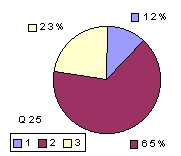
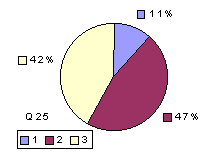
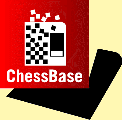

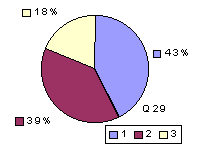
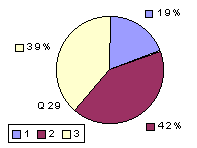


.gif)